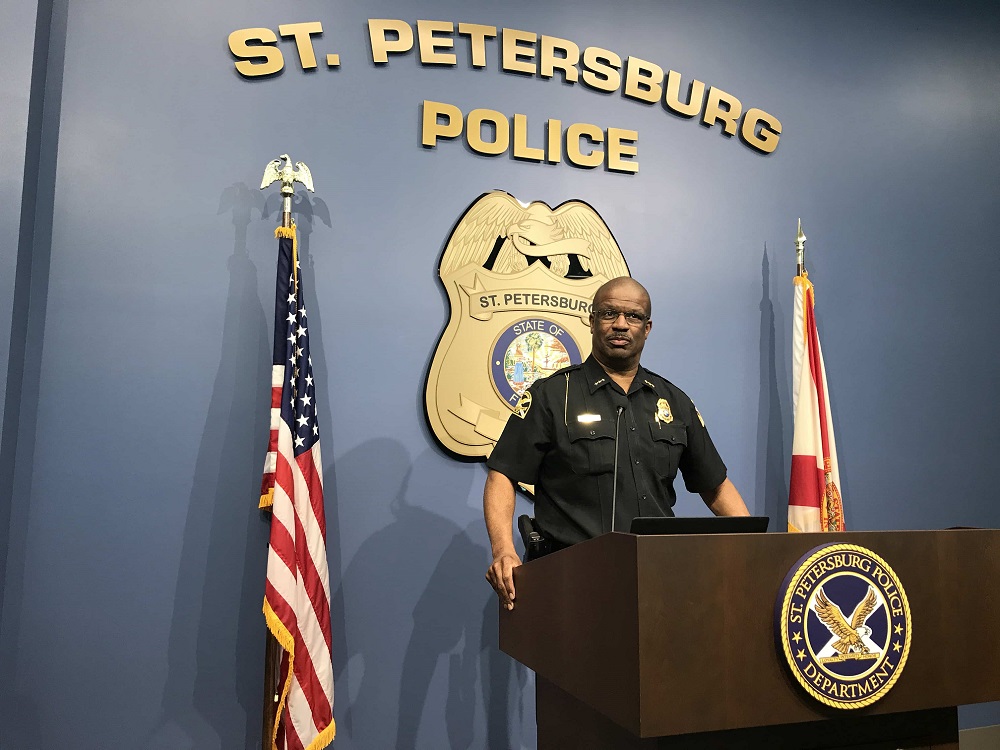By Margie Manning, St. Pete Catalyst
St. Petersburg Police Chief Anthony Holloway promised to support an expanded and improved program to keep some people accused of lower-level crimes out of jail, during the FAST Nehemiah Action Monday night.
Also at the event, Pinellas County Commissioner Dave Eggers, who currently is chair of the Board of County Commissioners, said he would prioritize funding for housing for the lowest-income families in the area.
But a third issue, easier access to mental health and substance abuse treatment, remains uncertain, according to FAST, or Faith and Action for Strength Together, a grass-roots coalition of more than 40 religious organizations in Pinellas County.
The group, which concentrates on justice issues, historically has held its annual Nehemiah Action at Tropicana Field, but pivoted to a hybrid online and in-person event this year due to the Covid-19 pandemic. More than 2,000 people attended either through Zoom or by driving to the parking lot of Sacred Heart Catholic Church in Pinellas Park.
Criminal justice — specifically the Pinellas Adult Pre-Arrest Diversion Program, or APAD — was one focus. People who commit certain misdemeanor offenses and meet eligibility requirements may be allowed to complete community service in lieu of a criminal charge.
But in 2019, of the 13,000 people who committed misdemeanors, only 1,100 were eligible for the program and only 700 completed it, FAST said. The organization asked all criminal justice stakeholders if they would work with FAST to identify specific ways to expand the program.
“We really do want to expand this program,” said Holloway, who attended the in-person event. “We want to make sure that people arrested on misdemeanors can move forward with their lives.”
Ken Burke, Pinellas County Clerk of the Courts and Alison Miller of the Pinellas County Public Defender’s office also agreed to work with FAST on the issue. Pinellas County Sheriff Bob Gualtieri was not at the event, but told FAST earlier that he is open to discussing ways to expand and improve the program.
Affordable housing
Affordable housing has been a key issue for FAST for several years. The organization has said the Pinellas County Board of County Commissioners failed to live up to their commitment in a 2019 resolution to use 4.15 percent of Penny for Pinellas sales tax funds for housing for those whose household income is 80 percent or less of the area median income.
“If the Pinellas County commissioners join with people of faith to prioritize the needs of the working poor, we can create a Pinellas County where nurses’ aides, day care workers, restaurant and hospitality employees, custodians and all working families can have a safe place to live,” said Bishop Gregory Parkes of the Diocese of St. Petersburg. “We can be instruments of hope.”
FAST asked commissioners to personally commit to only approving Penny funding for housing developments within the guidelines of the 2019 resolution. Commissioner Charlie Justice wrote a letter to FAST, making that commitment. Commissioners Pat Gerard, Janet Long, Karen Seel and Kathleen Peters did not attend and did not send a written response to the request, FAST said. Commissioner Rene Flower attended online. She said in a Facebook post that she sent FAST a response prior to the event.
Only Eggers attended the event in person. His initial response to FAST’s request was “Yes for the most part” and he asked for a conversation on the issue.
FAST leaders reframed the question, and asked if Eggers would personally prioritize families making 80 percent or less of area median income when it comes to housing using the Penny tax. “Yes,” Eggers said. “This county is dense and land is hard to come by so making these affordable housing deals is very difficult, but we are absolutely committed to prioritizing those folks 80 percent of AMI and under. That’s what this commission’s drive has been and it will continue to be that way as we move forward over the next eight or nine years of this Penny.”
Behavioral health
A third focus is mental health and addiction treatments. More than 600 people died of overdose and suicide in Pinellas County in 2019. The number of suicides was up 17 percent last summer compared to 2019 and the number of overdose deaths was up 25 percent. Accessing services is complicated and the county lacks a centralized pathway to find services, FAST said.
In 2019, FAST asked Pinellas County, the Foundation for a Healthy St. Petersburg and Central Florida Behavioral Health Network to work together to create that pathway. The foundation and the Central Florida group since have established the Wellness Connection, which provides a single number to call (727-791-3131) to get an appointment for needed services. In 2020, the Wellness Connection partners provided access to outpatient mental health and substance abuse treatment to more than 50,000 Pinellas County residents, said Linda McKinnon, president and CEO of Central Florida Behavioral Health.
The Wellness Connection is a good start, but Pinellas County still lags behind, FAST said. Barry Burton, county administrator, committed to a central pathway for services as recently as last week, but has not provided details on a timeline or next steps, FAST said. Burton did not attend Monday night’s event. FAST asked attendees to send letters to Burton asking for a response.
View the original story here.






